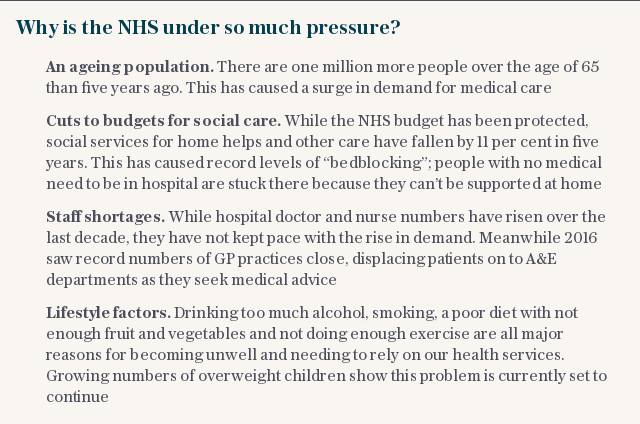Treatment for dementia, arthritis and blindness could be further rationed, health chiefs signal

Treatment for dementia, arthritis and blindness could be subject to deeper rationing, with “tough decisions and trade-offs” ahead, health chiefs have signalled.
NHS England said “affordability assessments” should be made of future recommendations by rationing bodies, to decide what the health service can afford to treat.
Its board yesterday forecast that waiting times for planned operations will rise, as they attempt to protect funding for cancer services, GPs and mental health.
Health officials said that waiting times standards, which set out limits of 18 weeks, will not be met next year, according to their forecasts.
But Health Secretary Jeremy Hunt last night hit back, insisting the targets will be met, and promising “sensible” discussions about the best way forward.
Under new proposals from NHS England, the National Institute for Health and Care Excellence (Nice) will be asked to publish “affordability and workforce assessments” of future recommendations on treatments, so the NHS can work out what it can pay for.

In coming years, the body which recommends NHS treatments, is due to produce guidance on management of dementia, rheumatoid arthritis and macular degeneration, one of the causes of blindness.
The discussions come after the Chancellor awarded a £2.8bn funding boost to the NHS, spread across three years - less than the £4bn next year sought by NHS chief Simon Stevens.
During the board meeting, a series of officials set out a series of challenges ahead, suggesting that the Government could be forced to drop its waiting list pledges, contained in the NHS constitution.
The board papers say the health service needs to be "realistic” about what it can deliver with the funds awarded.
Sir Malcolm Grant, chairman of NHS England, told the board meeting that the "tightness of the settlement" would be a "catalyst for change".
"There are going to have to be some tough decisions and trade-offs," he said.
There are going to have to be some tough decisions and trade-offs.
Sir Malcolm Grant, chairman of NHS England
With tensions between NHS England and the Government over the funding settlement, and Mr Stevens’ public demands for a funding boost, Sir Malcolm said that NHS England was “not a political entitity” and was established to be “independent” of Government.
Health officials said a new operating plan for the next financial year will be agreed in March, after disussions with Government.
Last night Jeremy Hunt said: “I would say very simply that the Government is absolutely committed to NHS constitutional standards, that is why we found a significant increase for the NHS in the budget.
“Our absolute determination is to move back to hitting those standards, which we’re not hitting all of at the moment – we recognise that. Part of that is a funding issue. Part of that also is a capacity issue. I think we will have constructive, sensible discussions with NHS England to find a way forward to meet our objective which is to get back to meeting those standards,” he told a King’s Fund conference in London.

 Yahoo News
Yahoo News 
